

Overfishing. Overfished US stocks, 2010 The ability of a fishery to recover from overfishing depends on whether the ecosystem's conditions are suitable for the recovery.
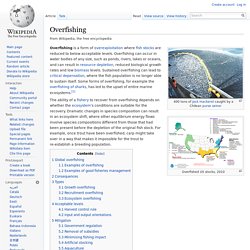
Dramatic changes in species composition can result in an ecosystem shift, where other equilibrium energy flows involve species compositions different from those that had been present before the depletion of the original fish stock. For example, once trout have been overfished, carp might take over in a way that makes it impossible for the trout to re-establish a breeding population. Global overfishing Overfishing has significantly affected many fisheries around the world. Www.greenpeace.org/overfishing. "There's enough on this planet for everyone's needs but not for everyone's greed" - Mahatma Gandhi For our children to have future income, food and pleasure we need healthy oceans and a healthy fishing industry.
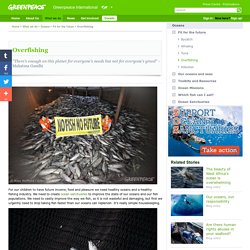
We need to create ocean sanctuaries to improve the state of our oceans and our fish populations. We need to vastly improve the way we fish, so it is not wasteful and damaging, but first we urgently need to stop taking fish faster than our oceans can replenish. It’s really simple housekeeping. But common sense is not working at the moment. Here are some facts and figures that may shock you: 63 percent of global fish stocks are now considered overfished. 40,000 jobs were lost with the collapse of just one overfished cod populationFishing fleets are heading to new waters because they have exhausted their old hunting grounds The fishing industry now has vessels that can go further, stay longer and catch more, easily out-fishing nature’s ability to replenish fish. Here's Who To Blame For America's Increased Contribution To Global Warming In 2013. By Emily Atkin Posted on Share this: "Here’s Who To Blame For America’s Increased Contribution To Global Warming In 2013" Share: CREDIT: Shutterstock A new report released by the Environmental Protection Agency on Thursday shows just how much large American industrial facilities including power plants, refineries, and chemical manufacturers contributed to global warming in 2013.

Emissions of greenhouse gases from large industrial sources increased by 0.6 percent since 2012, according to the EPA’s Greenhouse Gas Reporting Program data, which is compiled from reports sent in by more than 8,000 emitters. Overfishing. Overfishing. Fishing is one of the most significant drivers of declines in ocean wildlife populations.
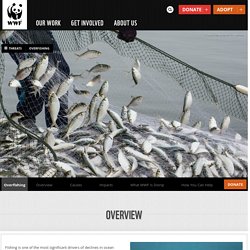
Catching fish is not inherently bad for the ocean, except for when vessels catch fish faster than stocks can replenish, something called overfishing. The number of overfished stocks globally has tripled in half a century and today fully one-third of the world's assessed fisheries are currently pushed beyond their biological limits, according to the Food and Agriculture Organization of the United Nations. EU sanctions 10 countries for overfishing with reduction of fishing quotas. The EC highlighted that compared to last year, quota deductions were reduced by 22%.
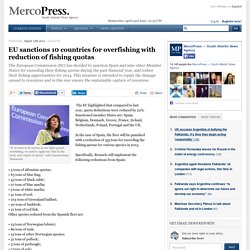
Sanctioned member States are: Spain, Belgium, Denmark, Greece, France, Ireland, Netherlands, Poland, Portugal and the UK. In the case of Spain, the fleet will be punished with a reduction of 555 tons for exceeding the fishing quotas for various species in 2013. Specifically, Brussels will implement the following reductions from Spain: • 3 tons of alfonsino quotas; • 63 tons of blue ling; • 43 tons of black sable; • 27 tons of blue marlin; • 5 tons of white marlin; • 41 tons of cod; • 103 tons of Greenland halibut; • 30 tons of haddock; • 21 tons of red fish.
Other species reduced from the Spanish fleet are: Historical Overfishing and the Recent Collapse of Coastal Ecosystems. National Geographic. Ocean overfishing is simply the taking of wildlife from the sea at rates too high for fished species to replace themselves.
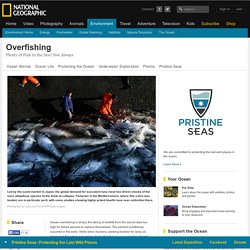
The earliest overfishing occurred in the early 1800s when humans, seeking blubber for lamp oil, decimated the whale population. Some fish that we eat, including Atlantic cod and herring and California's sardines, were also harvested to the brink of extinction by the mid-1900s. Highly disruptive to the food chain, these isolated, regional depletions became global and catastrophic by the late 20th century. When It Started. Tips on what young people can do about overfishing. What can I do about overfishing?
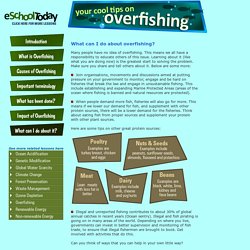
Many people have no idea of overfishing. This means we all have a responsibility to educate others of this issue. Learning about it (like what you are doing now) is the greatest start to solving the problem. Make sure you share and tell others about it. Below are some more: Join organisations, movements and discussions aimed at putting pressure on your government to monitor, engage and be hard on fisheries that break the law and engage in unsustainable fishing. When people demand more fish, fisheries will also go for more. Overfishing - Benefits of Overfishing. Over fishing. Explicit cookie consent. OVERFISHING is reaching catastrophic levels.
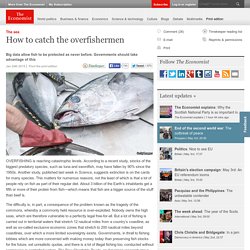
According to a recent study, stocks of the biggest predatory species, such as tuna and swordfish, may have fallen by 90% since the 1950s. Another study, published last week in Science, suggests extinction is on the cards for many species. Overfishing. Save Our Seas Foundation. One in five people on this planet depends on fish as the primary source of protein.
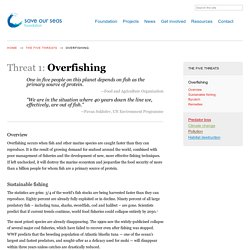
—Food and Agriculture Organization. Index Search - Find it now! Overfishing. Unsustainable fishing. As coastal and pelagic (open ocean) fisheries around the world have collapsed, fishing effort has shifted to the deep sea and previously unexploited fish species.
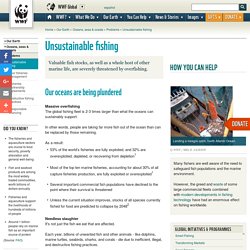
Here, overfishing can quickly deplete local fish populations - even within a single season. Some newly fished populations, such as monkfish, Patagonian toothfish, blue ling, and orange roughy, have already collapsed in some areas. There is insufficient data on other populations to determine what level of fishing is sustainable. At present most deep-water species are likely to be over-exploited - and as many as 40% of the world’s fishing grounds are now in waters deeper than 200m. Overfishing. Exploring Nature Educational Resource. What causes overfishing? How does overfishing happen? The causes of overfishing can be placed into these three categories: Overcapacity: All over the world, many fishing industries have huge vessels, equipment and technology that they can deploy deep into the oceans. They can stay on the oceans for weeks and months and even process the fish before they come back ashore. Experts believe that all the world’s equipment combined is enough to fish on 4 earth-like planets.
Unsustainable Fishing: This involves using nets, fishing methods and other equipment that catch too much fish to a degree that they are endangered. What measures are in place to control overfishing? Search results. Overfishing. If global overfishing continues, wild fish populations will be further reduced, regardless of how many boats are used or what techniques are employed. Today, most of the world’s major commercially valuable fish populations are overfished , and the remainder is exploited at their maximum possible level.
(National Oceanic Atmospheric Administration) In 1999, the United Nations Food and Agriculture Organization estimated that 70-78% of worldwide marine fish stocks require urgent intervention to prevent population declines and to help rebuild species depleted by over fishing. In the waters surrounding the United States, the U.S. Department of Commerce listed 959 different fish stocks in the 2001 Annual Report to Congress on the Status of U.S. Fisheries. The wild fish in our oceans are the last wild creatures that people hunt on a global scale. Overfishing: a threat to marine biodiversity. Overfishing: a threat to marine biodiversity Despite its crucial importance for the survival of humanity, marine biodiversity is in ever-greater danger, with the depletion of fisheries among biggest concerns.
Fishing is central to the livelihood and food security of 200 million people, especially in the developing world, while one of five people on this planet depends on fish as the primary source of protein. According to UN agencies, aquaculture - the farming and stocking of aquatic organisms including fish, molluscs, crustaceans and aquatic plants - is growing more rapidly than all other animal food producing sectors. But amid facts and figures about aquaculture's soaring worldwide production rates, other, more sobering, statistics reveal that global main marine fish stocks are in jeopardy, increasingly pressured by overfishing and environmental degradation. For further information: Mr. Young People's Trust For the Environment. It has been estimated by the United Nations Food and Agriculture Organisation that over 70% of the world’s fish populations are either fully exploited or depleted.
Overfishing. Important overfishing words for children. Google joins fight against overfishing. This is map from the Global Fishing Watch demonstrating how it can track a vessel, in this case the Wakashio Maru No. 118, around the globe Global Fishing Watch Efforts to fight overfishing on the high seas have long been hampered by a lack of enforcement and credible data. That is about to change with the announcement that Google is teaming up with the environmental group Oceania and remote sensing specialist SkyTruth to create Global Fisheries Watch, the first-ever global tracking system of its kind. Tide Turning in Fight Against Overfishing. This handout photo provided by the journal Science shows the Commonwealth Scientific and Industrial Research Organization's (CSIRO) Dr. Ending Overfishing. A global environmental problem, threat to our oceans and disaster. <p class="alert">You seem to have javascript turned off.
While you won't loose out on any information this site does uses javascript for some of its features. Overfishing. Overfishing. Facts on Overfishing - The World Counts. 10 Alarming Facts About Overfishing. We humans seem to have an appetite for destruction, and we are consuming our planet’s resources at an alarming rate. Some of our consumption is to satisfy a desire for a particular food, even though the repercussions of these actions are often shocking. Many people who decide to begin eating more responsibly, continue to eat fish or other sea animals. Unfortunately, fisheries and aquaculture are wreaking havoc on the oceans.
What is overfishing for children? What are the impacts of overfishing.